
Journal of Computational Methods in Sciences and Engineering
Scope & Guideline
Fostering Dialogue on Emerging Computational Trends
Introduction
Aims and Scopes
- Computational Algorithms and Modeling:
The journal emphasizes the development and application of computational algorithms, including optimization techniques, machine learning, and neural networks, to address real-world problems in engineering and sciences. - Interdisciplinary Applications:
Research published in the journal often spans multiple disciplines, showcasing how computational methods can be applied in fields such as environmental science, biomedical engineering, and materials science. - Big Data and Analysis Techniques:
A significant focus is placed on big data analytics, exploring how data-driven methods can enhance decision-making processes and improve outcomes in various sectors. - Innovative Engineering Solutions:
The journal highlights innovative engineering solutions that leverage computational methods, such as simulations, modeling, and advanced data processing techniques, to enhance efficiency and performance in engineering practices. - Sustainability and Environmental Impact:
Research concerning the sustainability of engineering practices and the environmental impact of various technologies is also a core area, reflecting the increasing importance of eco-friendly solutions.
Trending and Emerging
- Artificial Intelligence and Machine Learning:
The application of AI and machine learning techniques is rapidly increasing, with researchers focusing on developing novel algorithms and their applications in various domains, including finance, healthcare, and smart systems. - Internet of Things (IoT) Applications:
Research exploring the integration of IoT technologies with computational methods is trending, highlighting the importance of real-time data collection and analysis in enhancing system performance. - Sustainable Engineering Practices:
There is a growing emphasis on sustainable engineering practices that utilize computational methods to minimize environmental impact, optimize resource usage, and achieve sustainability goals. - Cybersecurity and Data Privacy:
With the rise of digital technologies, themes surrounding cybersecurity, data protection, and privacy measures are emerging as critical areas of focus within the journal's publications. - Blockchain and Distributed Ledger Technologies:
The exploration of blockchain technologies and their applications in various fields, including supply chain management and financial services, is becoming a prominent area of research.
Declining or Waning
- Traditional Engineering Methods:
Traditional methods of engineering analysis and design, such as deterministic modeling without computational enhancement, appear to be waning as researchers increasingly adopt advanced computational techniques. - Static Data Analysis:
Research that relies solely on static data analysis without incorporating real-time data processing or machine learning techniques is becoming less common, as the field moves towards more dynamic and responsive analytical methods. - Non-Computational Approaches:
There is a noticeable decline in the publication of studies that do not employ computational methods, as the journal increasingly prioritizes contributions that integrate computational techniques with empirical research.
Similar Journals

Computer Science Journal of Moldova
Advancing Knowledge in Artificial Intelligence and BeyondComputer Science Journal of Moldova, published by the Institute of Mathematics and Computer Science Academy, serves as a pivotal platform for disseminating research in the field of computer science since its inception in 1993. With a focus on a diverse range of subjects, including Artificial Intelligence, Computational Mathematics, and Software Engineering, this open access journal aims to foster innovation and collaboration among researchers, students, and industry professionals. Despite its current positioning in the lower quartiles as per the latest Scopus rankings, the journal remains committed to enhancing the visibility of regional research and addressing contemporary challenges through scholarly contributions. The journal’s open access model ensures that knowledge is freely available, promoting broader readership and impact within the international academic community. As it moves through the converged years from 2019 to 2024, the Computer Science Journal of Moldova continues to aspire toward empowering the next generation of computer scientists while enriching the global dialogue in this rapidly evolving field.
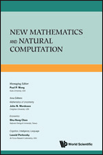
New Mathematics and Natural Computation
Exploring the Fusion of Mathematics and Nature's LogicNew Mathematics and Natural Computation, published by World Scientific Publishing Co Pte Ltd, is a pivotal journal in the realms of applied mathematics and computational theories, catering to a diverse audience of researchers, professionals, and students. With an ISSN of 1793-0057 and E-ISSN 1793-7027, this journal serves as a critical platform for disseminating innovative research and methods that intertwine mathematical theories with natural computation processes. Operating from Singapore, it emphasizes accessibility and collaboration in advancing interdisciplinary knowledge, despite its current Q4 rankings across relevant categories such as Applied Mathematics and Human-Computer Interaction—highlighting the journal’s commitment to growth and improvement in a competitive publishing landscape. As a source of insightful findings and applications in mathematics and computer science, it invites contributors to explore the dynamic intersections between these fields and foster academic dialogue. Researchers aiming to engage with cutting-edge advancements will find this journal instrumental for their work from its inaugural issue in 2012 through its projected publications into 2024.
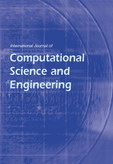
International Journal of Computational Science and Engineering
Unleashing Knowledge in the Realm of Computational ScienceThe International Journal of Computational Science and Engineering, published by InderScience Enterprises Ltd, is a premier platform dedicated to the interdisciplinary field of computational science and engineering. With an ISSN of 1742-7185 and an E-ISSN of 1742-7193, the journal has been serving the academic community since its establishment in 2005 and will continue to do so until 2024. Notably categorized in the Q3 quartile for various domains, including Computational Mathematics, Software, and Hardware and Architecture, it holds respectable rankings in Scopus, evidencing its importance in advancing research and practice. While the journal is not open-access, it offers subscription options that ensure wide dissemination among researchers, professionals, and students. The journal aims to publish high-quality original research articles, survey papers, and case studies that contribute to the theoretical and practical aspects of computational techniques and methodologies. In a rapidly evolving digital landscape, this journal is a valuable resource for those seeking to push the boundaries of knowledge in computational science.

COMPUTATIONAL GEOSCIENCES
Bridging Theory and Application in GeosciencesCOMPUTATIONAL GEOSCIENCES, published by SPRINGER, is a distinguished journal in the fields of Computational Mathematics, Computational Theory and Mathematics, and Computer Science Applications. With a focus on the intersection of computational methodologies and geosciences, this journal serves as a vital platform for researchers, professionals, and students seeking to advance the understanding and application of computational techniques in earth sciences. The journal has consistently maintained a strong standing, evident from its impressive Q2 quartile ranking in 2023 across various categories, and significant Scopus rankings in Computational Mathematics and Earth and Planetary Sciences. The global impact of this journal is underscored not only by its rigorous peer-review process but also by its commitment to disseminating high-quality research that bridges theoretical advances and practical applications within the earth sciences domain. Scientifically rich and culturally diverse, COMPUTATIONAL GEOSCIENCES aims to foster collaboration and innovation while addressing pressing challenges posed by our changing planet, making it an essential resource for the academic community.

Engineering Letters
Connecting Ideas, Inspiring Engineers: Your Platform for ProgressEngineering Letters, published by NEWSWOOD LTD, is a prominent journal in the field of engineering, focusing on innovative research and interdisciplinary studies that reflect the current trends and applications in the engineering landscape. With an ISSN of 1816-093X and an E-ISSN of 1816-0948, this open-access journal strives to provide a platform for researchers, professionals, and students to disseminate insights and findings that contribute to engineering knowledge. Based in Hong Kong, Engineering Letters has maintained a respectable standing with a 2023 Q3 quartile ranking in the miscellaneous category of engineering and ranks #142 out of 307 in general engineering according to Scopus, signifying its influence with a 53rd percentile ranking. The journal’s convergence years, spanning from 2009 to 2024, encapsulate an evolving landscape of engineering discussions and innovations, aimed at fostering collaborations and inspiring the next generation of engineers.
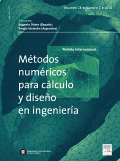
Revista Internacional de Metodos Numericos para Calculo y Diseno en Ingenieria
Advancing Numerical Methods for Engineering ExcellenceRevista Internacional de Metodos Numericos para Calculo y Diseno en Ingenieria is a prominent academic journal dedicated to the dissemination of innovative research and methodologies in the fields of applied mathematics and engineering. Published by SCIPEDIA S L in Spain, this journal has been an essential resource for researchers since its inception in 1987, transitioning to an Open Access model in 2016 to enhance accessibility and foster collaboration among professionals and academics globally. Currently indexed in Scopus, it holds a Q4 category designation in both applied mathematics and miscellaneous engineering fields for 2023, reflecting its focus on advancing numerical methods to solve engineering problems. Despite ranking at the lower percentile, it serves as a vital platform for emerging scholars and practitioners aiming to contribute to cutting-edge developments in numerical techniques and engineering design. The journal's commitment to providing a forum for new ideas makes it an invaluable asset for students, researchers, and industry professionals seeking to stay abreast of advancements in the discipline.
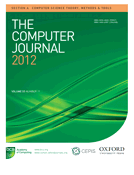
COMPUTER JOURNAL
Shaping the Future of Technology Through Scholarly ExcellenceCOMPUTER JOURNAL, published by Oxford University Press, is a distinguished platform for innovative research in the field of computer science, with a focus on general and miscellaneous aspects. The journal, established in 1967, continues to advance the boundaries of knowledge in computational technologies, algorithms, and interdisciplinary applications, contributing to its impressive ranking of Q2 in the 2023 Scopus category for Computer Science. With a robust ISSN of 0010-4620 and E-ISSN 1460-2067, it serves as a vital resource for researchers, professionals, and students seeking to stay at the forefront of technological advancements. Though not an open-access journal, it provides numerous access options via institutional subscriptions, making its high-impact articles widely available, especially as the journal bridges over five decades of research from 1967 to 2024. The COMPUTER JOURNAL is committed to fostering scholarly communication and ensuring that critical insights in the ever-evolving realm of computer science reach a diverse audience, thus solidifying its role as an essential resource in academia.
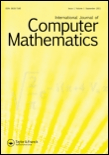
INTERNATIONAL JOURNAL OF COMPUTER MATHEMATICS
Fostering Insightful Research in Mathematical ComputingThe International Journal of Computer Mathematics, published by Taylor & Francis Ltd, stands as a prominent forum for the dissemination of novel research in the intersection of mathematics and computing. Established in 1964, this journal has evolved significantly, contributing to the field with robust methodologies and innovative applications. It holds notable rankings within Scopus, classified as Q2 in Applied Mathematics and Q3 in both Computational Theory and Mathematics and Computer Science Applications for 2023, highlighting its pivotal role in advancing academic discourse. Though it is not an open-access journal, its rigorous peer-review process ensures that published articles maintain the highest scholarly standards, making it a reliable source for cutting-edge research. Researchers, professionals, and students alike will find valuable insights and advancements that push the boundaries of mathematical applications in computing, solidifying its importance within the mathematical and computer science communities.

Computation
Transforming challenges into solutions through computation.Computation, published by MDPI, is an esteemed open-access journal that has been contributing to the fields of applied mathematics and computer science since its inception in 2013. With an E-ISSN of 2079-3197, this Swiss-based journal operates under a philosophy of free knowledge dissemination, allowing researchers, professionals, and students globally to access high-quality content without financial barriers. Recognized for its rigorous peer-review process, Computation is currently categorized in the Q2 and Q3 quartiles across significant domains, including Applied Mathematics (#181/635), Theoretical Computer Science (#52/130), and Modeling and Simulation (#138/324). As it converges towards 2024, the journal continues to attract innovative and impactful research aimed at advancing theoretical frameworks and practical applications within these disciplines. Joining the Computation community not only enriches individual research portfolios but also contributes to the broader conversation on computational methodologies and their applications in solving real-world problems.

Computational and Mathematical Methods
Bridging Theory and Practice in Computational MathematicsComputational and Mathematical Methods is a dynamic peer-reviewed journal published by Wiley-Hindawi, focusing on innovative research in the fields of computational mathematics, mechanics, and theory. Since its transition to an Open Access format in 2022, the journal has enhanced its accessibility to researchers and practitioners globally, providing a platform for the dissemination of high-quality studies that contribute to emerging developments in mathematical modeling and computational techniques. Based in the United Kingdom, this journal is committed to fostering collaboration amongst scholars, evidenced by its rankings within Scopus: Q3 in computational mathematics, computational mechanics, and computational theory and mathematics, reflecting its relevance and influence within these critical fields. With an emphasis on interdisciplinary studies, Computational and Mathematical Methods is an essential resource for researchers, professionals, and students seeking to expand their knowledge and apply cutting-edge methodologies to practical challenges.